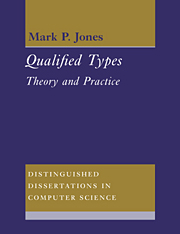Book contents
6 - Theory into practice
Published online by Cambridge University Press: 05 May 2010
Summary
This chapter describes a number of features that might be useful in practical work with qualified types. We adopt a less rigourous approach than in previous chapters and we do not attempt to deal with all of the technical issues that are involved.
Section 6.1 suggests a number of techniques that can be used to reduce the size of the predicate set in the types calculated by the type inference algorithm, resulting in smaller types that are often easier to understand. As a further benefit, the number of evidence parameters in the translation of an overloaded term may also be reduced, leading to a potentially more efficient implementation.
Section 6.2 shows how the use of information about satisfiability of predicate sets may be used to infer more accurate typings for some terms and reject others for which suitable evidence values cannot be produced.
Finally, Section 6.3 discusses the possibility of adding the rule of subsumption to the type system of OML to allow the use of implicit coercions from one type to another within a given term.
It would also be useful to consider the task of extending the language of OML terms with constructs that correspond more closely to concrete programming languages such as recursion, groups of local binding and the use of explicit type signatures. One example where these features have been dealt with is in the proposed static semantics for Haskell given in (Peyton Jones and Wadler, 1992) but, for reasons of space, we do not consider this here.
- Type
- Chapter
- Information
- Qualified TypesTheory and Practice, pp. 67 - 77Publisher: Cambridge University PressPrint publication year: 1994



